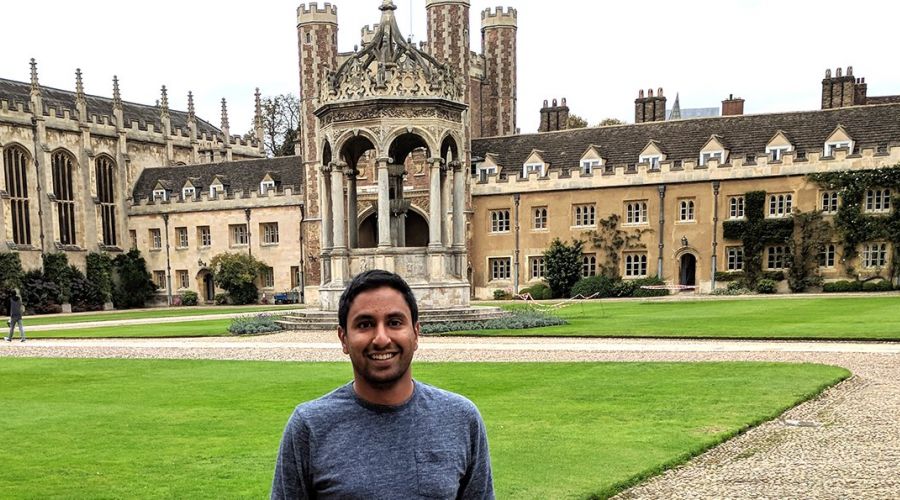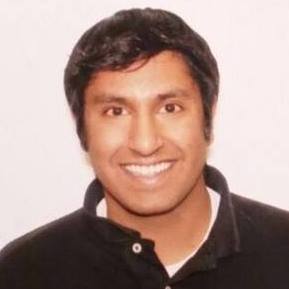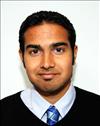
Kumar Thurimella will combine his maths and medical knowledge for his PhD in Biotechnology looking at new ways to tackle inflammatory disease.
Combining mathematical models and engineering opens up new ways forward. It’s a very exciting time to be in this field.
Kumar Thurimella
Kumar Thurimella’s PhD in Biotechnology will use mathematical modelling to understand the mechanisms behind inflammatory diseases and aid the possible discovery of future treatments.
When he starts at the University of Cambridge in the autumn, he will be working with Dr Roisin Owens in Biotechnology and Dr Sergio Bacallado in the Statistical Laboratory to develop a mathematical framework for validating a bioelectronic model of the gut, something he believes could be “a game changer for pharmaceutical treatments” for autoimmune diseases.
Kumar’s interest is both personal and academic. His father, who was a computer science professor and fuelled Kumar’s passion for mathematics, suffers from the autoimmune disease, ulcerative colitis, and Kumar has seen the impact it has had. “I saw how debilitating ulcerative colitis was for him. At some point it becomes very hard to live with,” he says.
Kumar [2020], who is also in the middle of medical training, says he believes it will become increasingly important to bring the world of maths into medicine. “Every day we are doing more analytics and learning more about the human body and the autoimmune system in particular,” he says. “Combining mathematical models and engineering opens up new ways forward. It’s a very exciting time to be in this field.”
A fascination for fundamental maths
Kumar was born outside Washington DC, but moved to Denver, Colorado, very soon after. Dinner table conversation at home, due to his father’s profession, was about theoretical computer science and maths. Although he started his degree at the University of Colorado at Boulder majoring in chemical and biological engineering, working on fluid mechanics and material energy balance, Kumar found himself drawn to the formulae used to derive equations linked to fluid mechanics.
All those dinner table conversations had ignited his intellectual curiosity. “What excited me was trying to understand the fundamental maths behind problems,” he says. He switched to applied mathematics. “It is so beautiful and intricate. You have a world in maths where you can carve out black and white answers that respond to some kind of fundamental truth. Understanding it made engineering make more sense,” says Kumar.
His university was hiring a lot of mathematical biologists at the time and Kumar worked for three summers at the laboratory of Professor Rob Knight building computational tools and did his thesis on a statistical modelling tool he devised to predict microbiome environment, using data from illnesses to get insight. Kumar also did an internship at the Washington University St. Louis School of Medicine where he first heard about the Gates Cambridge Scholarship through Dr Sathish Subramanian [2008], a colleague and former scholar who was looking to understand the microbiome communities of underdeveloped children.
Silicon Valley
When he finished his degree, Kumar was advised by Professor Knight to supplement his theoretical knowledge with the kind of cutting-edge software skills he could acquire in a leading tech firm. His brother, a software engineer, was working in Silicon Valley for Google so he packed his bags and headed West.
Kumar worked for four years as a software engineer at Uber, which was in a phase of major growth when he joined. The pace was fast and he learnt how to adapt quickly to circumstances and acquired new skills from the leading software engineers who flocked there from around the world as the company expanded.
Initially he was working on data warehousing, but he moved over to looking at more internal-facing issues, for instance, building a system to score CVs and match them to appropriate roles to free up hiring managers’ time. His mentor at Uber, Dr Fang Liu, who had helped him on more mathematical tasks such as a scheduling tool to make business operations more efficient, had a PhD in Computer Science and, talking to him, Kumar began to hanker once again to work in academia and on the health tech projects he was passionate about.
Genetics
Dr Liu wrote a letter of recommendation for his master’s application to the Sanger Institute at the University of Cambridge. Kumar did a master’s in Biological Sciences with an emphasis on computational biology in Dr Gosia Trynka’s Group. He was interested in understanding the genetics of autoimmune diseases affecting the bowel and in bringing together the kind of work he had been doing in Professor Knight’s laboratory with the genetics of autoimmunity.
He says: “I was interested in the genetic side of the autoimmune diseases and in bringing together microbiome and genetic research so I could see the whole picture.”
During his master’s, Kumar worked to create an imputation tool to predict missing information in the human genome. “The aim was to recover the genetic differences between people with disease and those who don’t have it,” he says.
After his MPhil, Kumar returned to the US to begin his medical training at the University of Colorado Medical School. He opted for the research track and worked with Dr Cathy Lozupone to build software tools for microbiome analysis. That experience inspired him to apply for a PhD at Cambridge where he hopes to further his work in understanding the underpinnings of autoimmune disease. He says that, although his father initially wanted him to do computer science, he appreciates that there are similar problems in other fields and that being able to speak both the language of medicine and of computer science is vital for the future of medicine in a digital age.

Kumar Thurimella
- Alumni
- United States
- 2020 PhD Biotechnology
- Gonville and Caius College
I am a current MD/PhD student split between the University of Colorado-School of Medicine and the University of Cambridge. As an applied mathematician/software engineer turned future physician, I am excited to apply my computational and mathematical background to help in the discovery of mechanisms behind inflammatory diseases of the gut.In my PhD portion of my training in Biotechnology and Mathematics/Statistics where I work with Dr. Roisin Owens and Dr. Sergio Bacallado on developing a mathematical/statistical tools for validating bioelectronic models of the gut. Previously, I worked as a Software Engineer at Uber in San Francisco for 3 years. I have my MPhil at Cambridge working at the Sanger Institute. I completed my BS in Applied Mathematics at University of Colorado-Boulder, where I am originally from.
Previous Education
University of Colorado at Denver Medicine 2026
University of Cambridge Biological Sciences 2018
University of Colorado at Boulder Applied Mathematics 2013
Links
https://www.linkedin.com/in/kumarthurimella
http://kumarthurimella.com

Sathish Subramanian
- Alumni
- India
- 2008 MPhil Biological Science
- Darwin College
My particular interest is in studying infectious diseases afflicting communities in low-income countries and thereby engineering novel ways to counter them. Malaria is an unrelenting disease in Zambia, as it is in many other countries of the sub-Sahara. Based at the Wellcome Trust Sanger Institute, I will use the latest life science research methodologies at large scale to study the pathways utilized by the wily malaria parasite to invade human erythrocytes. This approach may uncover specific invasion molecules associated with severe clinical malaria, potentially important candidates for future vaccine or drug development. I look forward to being a part of this eclectic community of scholars and honing my skills as a scientist under the mentorship of leading malaria researchers at the Sanger.
Previous Education
University of Pennsylvania BA (Biochemistry & Biology), MSc (Chemistry) 2008












